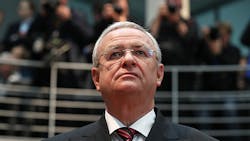Martin Winterkorn, the former Volkswagen AG CEO, sought to distance himself from actions that led to the biggest scandal in the carmaker’s history, saying he would have put a stop to the emissions cheating if he had known.
In his first public appearance since being forced to resign 16 months ago, Winterkorn apologized for breaching the trust of millions of customers while defending his tenure and saying that he wasn’t directly involved in complying with emissions regulations.
“It’s incomprehensible why I wasn’t informed early and clearly,” Winterkorn, 69, said in testimony before a parliamentary committee in Berlin. “I would have prevented any type of deception or misleading of authorities.”
Winterkorn portrayed himself as an upright, quality-focused executive who maintained an open-door policy and was receptive to criticism. More than a year after the scandal burst into the public, senior management’s involvement in the cheating remains unclear, and Winterkorn defended himself on Thursday by claiming he’s no software engineer and that the rogue acts didn’t rise to his level.
Still, his claim that he was unaware of technology installed in 11 million cars worldwide to deceive emissions testers contrasts with his reputation as a detail-obsessed executive who was known for upbraiding VW employees for even minor design flaws. An engineer who rose through the ranks at Volkswagen and built it into the world’s biggest carmaker, Winterkorn has seen his legacy tarnished by a scandal that has cost the company 20.5 billion euros ($21.77 billion) so far and led to the indictment in the U.S. of six senior executives.
While Volkswagen has been forced to admit that the scheme to falsify emissions test results wasn’t restricted to a few engineers as it initially claimed, it’s still unclear how much Winterkorn knew. He refused to answer some questions about the extent of his knowledge, citing a right to not incriminate himself amid a German criminal probe into allegations of market manipulation. Winterkorn reiterated his defense that the company initially thought the emissions issue was isolated to the U.S. and could be contained.
German members of parliament are questioning Winterkorn as part of an inquiry into what the government knew about emissions manipulation by carmakers and whether regulators took actions to prevent the cheating. He said he told Chancellor Angela Merkel about the issue in September 2015, the same month that U.S. authorities published their findings.
The former CEO hasn’t appeared in public since Volkswagen released an awkward filmed apology from him on Sept. 22, 2015. In the video, a visibly shaken Winterkorn looked anxiously into the camera and read a statement saying that he’s “endlessly sorry.” He resigned a day later.
There are indications that Winterkorn may have missed warning signs before the crisis erupted. VW said in a court filing last year that Winterkorn received two memos informing him of discrepancies in U.S. diesel emissions in 2014 and participated in a meeting in July 2015 that touched on the matter.
Winterkorn apologized again on Thursday, acknowledging that the scandal has damaged Volkswagen’s reputation. Stepping down from the company was the “most difficult” moment of his life, he said. Still, he denied involvement, saying he didn’t fully understand the software used to falsify emissions results.
In September 2015, U.S. regulators announced that Volkswagen had been installing so-called defeat devices in its cars in order to falsify emissions readings when the vehicles were being tested. Hit with criminal charges in the U.S. and lawsuits from consumers and investors worldwide, the company has reached several settlements including a $4.3 billion deal struck with the U.S. government last week.
The scandal has sent shock waves across the entire industry and sparked scrutiny from regulators across the globe over automakers’ compliance with emission rules.
“What happened makes people furious — me too,” Winterkorn said. “I’m deeply upset that we disappointed millions of our customers.”
By Karin Matussek and Christoph Rauwald
About the Author
Bloomberg
Licensed content from Bloomberg, copyright 2016.
